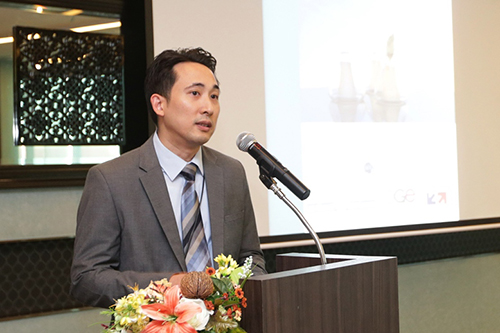One of the biggest questions at the Exponential Manufacturing Thailand 2019 summit was: what does the future of manufacturing in Thailand look like? With a room full of the country’s leading businesses, the answer will likely shape the future. According to a trio of experts, the country’s future will be shaped by how well Thailand embraces technology.
“There is a big gap in converging technology in Thailand. Businesses have access to the technology, but can’t always adapt into strategies and processes. This is where it fails. It is important for companies to create special structures and then invest in these to ensure technology is best utilized,” Mikolaj Jan Piskorski, Director of Digital Business Excellence at IMD, said.
Dr. Chaya Chandavasu, Senior Vice President, Science and Innovation at PTT Global Chemical, pointed out that Thailand is being disrupted. Banking, telecommunications and even manufacturing have already been impacted, but its consequences aren’t entirely negative.
“Disruption has created new opportunities. We can’t just bring in technology and hope it works for us. We need to bring in the right people and processes,” Dr. Chaya explained. “It is challenging. You need to start by changing the mindset. If you do this, the rest will follow. Then technology can be used as a tool. And once people see the benefits of using it and that it isn’t going to replace them, they will be open to it like any other tool.”
Knowledge and education are also vital areas to the success of manufacturing in the future. Dr. Anja Boisen, Faculty of Nanotechnology at Singularity University, recalled seeing students in Thailand needing more hands-on experience. She noted they had the knowledge already, but couldn’t put it into practice. It is an experience the entire manufacturing sector could learn from.
“Thailand has knowledge in manufacturing. It is already a step ahead of many countries in that regard. While other countries are trying to bring manufacturing back, they don’t have the knowledge to do so and must relearn it,” Dr. Boisen said. “However, it is very important to add value to what is here. The knowledge needs technology and experience for a more successful future.”
Additionally, Thailand’s large corporates need a healthy business ecosystem where companies of all sizes can thrive. SMEs are the group most vulnerable to being left behind as new technologies may be beyond their reach.
“Big companies have the resources, but we need to support SMEs so they have access to new technologies and processes,” Dr. Chaya noted, “They have to be able to adapt and evolve, but they may not have the means to do this on their own. It shouldn’t just be the big companies that have the ability to do this.”


































